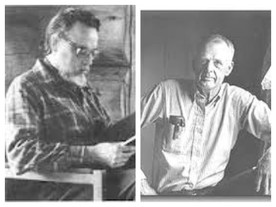
In the context of an essay that discusses the early chapters of Genesis, John Howard Yoder has this to say while discussing God's command and the forbidden tree in the garden:
"One fruit, one tree, is not for us to dispose of. We are not absolute; the garden's subjection to our viceregal management is not unconditional. The order we administer is not for us to change. What is wrong with seizing the fruit of the forbidden tree is not simply that it formally disobeys an arbitrary and irrational rule promulgated by an absolute and absentee landlord. Seizing the fruit is the claim to sovereignty: 'You shall be godlike' the serpent had said."
Yoder continues, now bringing the perennial theme of those early chapters of Genesis into the present day:
"Because we are not godlike, we must discover and yield to the law of limits and balance that govern life; we are not free to remove vegetation or to add freon as we wish. We cannot graze goats across North Africa without making a Sahara. We cannot plow the prairies without making a dust bowl. We cannot dam the Nile, or log the rain forests or the Himalayas, or send our waste down the sewer, without untoward surprises. To think that we are able (arbitrarily) to control the system will mean seeing the (relative) control we did have slip from our grasp. What was a fertile garden with whose natural potential we could cooperate becomes a desert peopled by weeds and thistles, demanding burdensome labor before yielding any fruit. Death is the final verdict condemning the effort to break free of the divinely intended harmony; our final link with the soil is that having refused to harmonize with it when alive, we are reabsorbed by it when dead." (from "On Generating Alternative Paradigms," in Human Values and the Environment: Conference Proceedings, Report 140 [Madison, WI: Wisconsin Academy of Science, Arts, and Letters, 1992], 58)
This last line reminded me of one of my favorite Wendell Berry poems from . Although Berry quotes Scripture infrequently, his work resounds with the themes of Gen. 1-2 and Phil. 2:5-11: only in acknowledging our limits, our place as creatures (and therefore not the Creator), will we ever find rest.
"The mind that comes to rest is tended
In ways that it cannot intend:
Is borne, preserved, and comprehended
By what it cannot comprehend.
Your Sabbath, Lord, thus keeps us by
Your will, not ours. And it is fit
Our only choice should be to die
Into that rest, or out of it."
We will either die daily into an awareness of our limits and that God is God and we are not, or we will continue to resist the fact that we are creatures, thereby condemning ourselves to be, as Augustine put it, "restless until we rest in Thee."
"One fruit, one tree, is not for us to dispose of. We are not absolute; the garden's subjection to our viceregal management is not unconditional. The order we administer is not for us to change. What is wrong with seizing the fruit of the forbidden tree is not simply that it formally disobeys an arbitrary and irrational rule promulgated by an absolute and absentee landlord. Seizing the fruit is the claim to sovereignty: 'You shall be godlike' the serpent had said."
Yoder continues, now bringing the perennial theme of those early chapters of Genesis into the present day:
"Because we are not godlike, we must discover and yield to the law of limits and balance that govern life; we are not free to remove vegetation or to add freon as we wish. We cannot graze goats across North Africa without making a Sahara. We cannot plow the prairies without making a dust bowl. We cannot dam the Nile, or log the rain forests or the Himalayas, or send our waste down the sewer, without untoward surprises. To think that we are able (arbitrarily) to control the system will mean seeing the (relative) control we did have slip from our grasp. What was a fertile garden with whose natural potential we could cooperate becomes a desert peopled by weeds and thistles, demanding burdensome labor before yielding any fruit. Death is the final verdict condemning the effort to break free of the divinely intended harmony; our final link with the soil is that having refused to harmonize with it when alive, we are reabsorbed by it when dead." (from "On Generating Alternative Paradigms," in Human Values and the Environment: Conference Proceedings, Report 140 [Madison, WI: Wisconsin Academy of Science, Arts, and Letters, 1992], 58)
This last line reminded me of one of my favorite Wendell Berry poems from . Although Berry quotes Scripture infrequently, his work resounds with the themes of Gen. 1-2 and Phil. 2:5-11: only in acknowledging our limits, our place as creatures (and therefore not the Creator), will we ever find rest.
"The mind that comes to rest is tended
In ways that it cannot intend:
Is borne, preserved, and comprehended
By what it cannot comprehend.
Your Sabbath, Lord, thus keeps us by
Your will, not ours. And it is fit
Our only choice should be to die
Into that rest, or out of it."
We will either die daily into an awareness of our limits and that God is God and we are not, or we will continue to resist the fact that we are creatures, thereby condemning ourselves to be, as Augustine put it, "restless until we rest in Thee."
 RSS Feed
RSS Feed